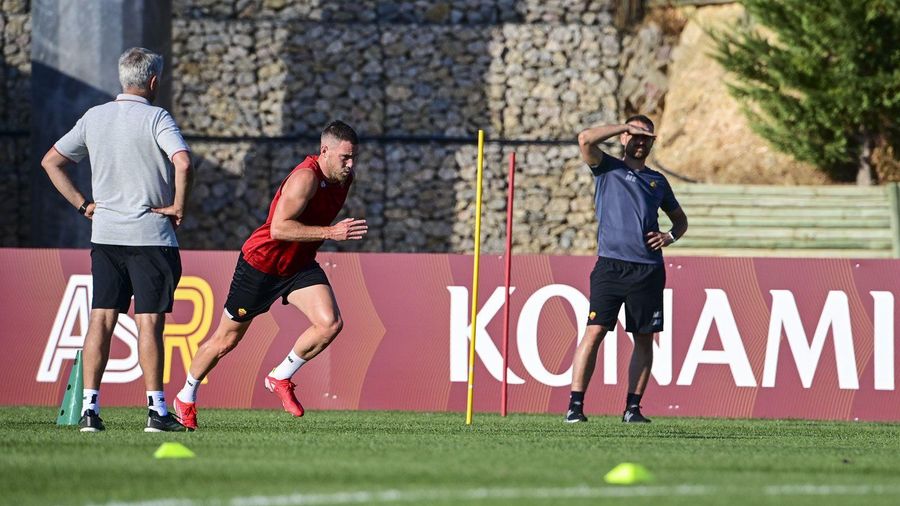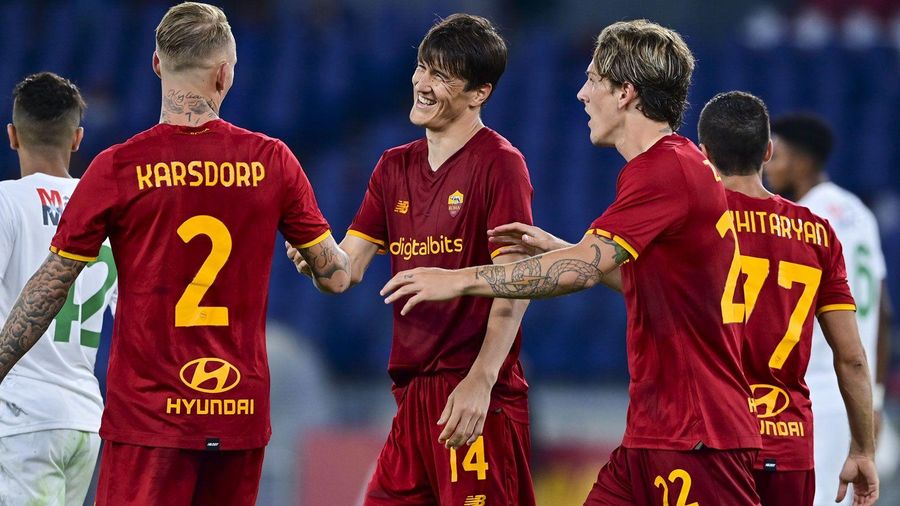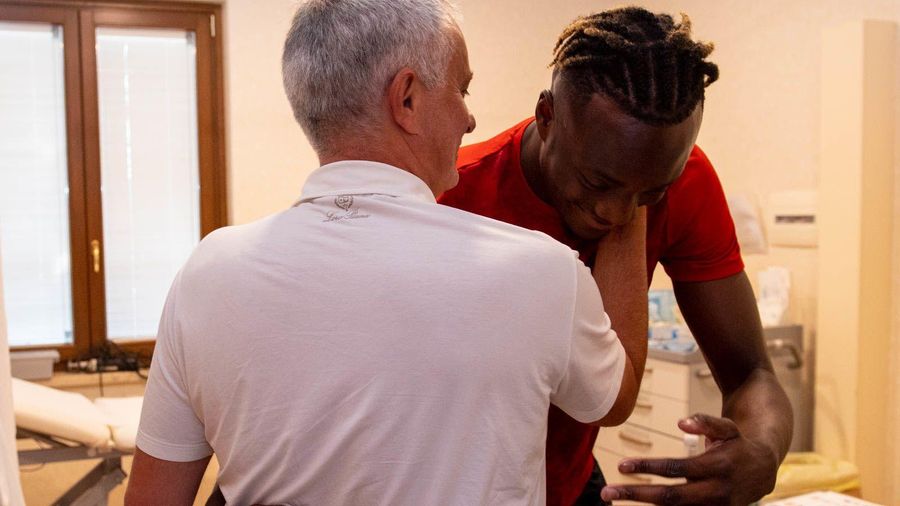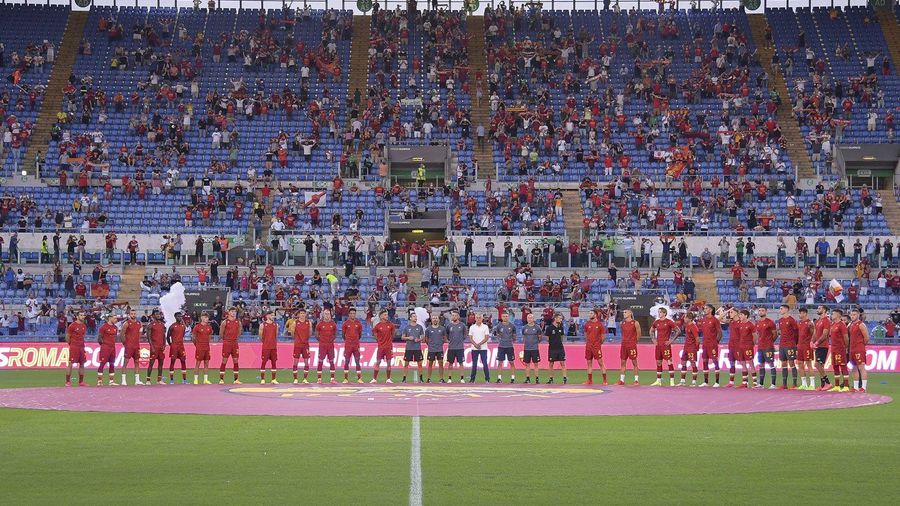
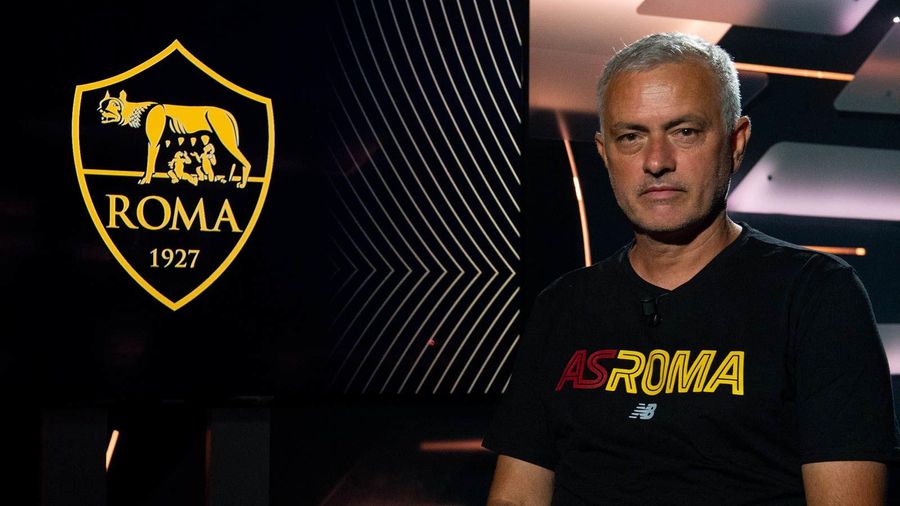
Having joked on social media that he had never gone so long in his career without speaking to the media, we sat down with the Portuguese boss to break that streak – and find out his thoughts having completed his first pre-season at the club.
From new arrivals to the hard work put in during the club’s training camp in Portugal, Mourinho was open and frank about the progress being made so far.
On the eve of the new season, here’s everything the boss had to say…
Roma’s pre-season came to an end on Saturday and we’re now in the final week building up to competitive football. What have you made of your first 40 days at the club?
“We’ve been working so hard! I’m very pleased. We’ve all worked so hard over the last few weeks, but it’s a pleasure when you have so many people who want to work hard, improve and are motivated to do well. I’m not just talking about the players, but everyone who’s been involved in our pre-season.
“As we all know, it’s difficult with the temperature [here]. The weather conditions can make it hard to do our work, but we’ve been striving to improve physically and tactically, and to perform as a team. At the same time, we’re also talking about the work we’re doing to organise the club’s various internal departments that revolve around the team.
“We also must not forget it’s been a very difficult transfer window to navigate and a huge workload for general manager Tiago Pinto, the scouts and, of course, the owners, who’ve had to make some tough decisions.
“After all the hard work, the time that we all enjoy is now on the horizon, although I’m a person who always says I don’t like the word ‘friendly’ and that 'matches are matches'. We’ve all tried to treat this period as a source of motivation for everyone. We’re playing for three points on Sunday against Fiorentina.
"Having said that, it’s even more difficult to play knockout football than it is to play for three points. We’re starting on Thursday in Turkey and that’s the sort of positive pressure that I want to have and that my players want to have.
“Fans certainly also enjoy themselves much more during 'real games', as I like to call them.”
In terms of training, the squad has only had a few rest days and the sessions have been at high intensity. Based on your social media posts, you seem very pleased with how the players have done. How much are you enjoying the challenge of coaching them? You seem to be enjoying it a lot.
“I do really like it. I can’t say much more, but I do really like it. I also feel everyone has liked the way we’ve organised the sessions. As you say, we’ve often worked at high intensity because that’s our philosophy and that reflects the way we understand the game. At the end of the day, you play in the way that you train and you can also say that you train in the way that you play. We obviously want to play with intensity, so that’s what we’ve done every day.
“There’s also a less visible nature of our work which is harder to understand, especially for those on the outside, which is what we’ve done in the gym in terms of injury prevention and recovery.
“We’ve always focused on trying to find a direction where there are positive feelings. We have so many people working alongside the players here: fitness coaches, sport scientists, the medical department and many others who are so dedicated to their jobs.
“We have a very good relationship in terms of the scheduling of our training sessions, which I think is also something that the players feel.
“The work is hard, but at the same time they feel the club is behind them and I think that helps them feel that they can go all the way and work with real intensity because everything is under control.”
How important was it to be in such close proximity with the players in Portugal?
“The two or so weeks here in Trigoria were good for making initial contact so that I could get to know them and they could get to know me.
“We were together here for a few days, not just to train. We also had dinner together and also stayed the night a few times in order to speed that process up.
“Portugal was certainly key. I’m not saying that because it’s my home and because it’s Portugal, but because the team was effectively together 24 hours a day for two weeks.
“It helped me understand so much. I think we all left Portugal as a better team both tactically and technically, but, above all, we grew as a group given that we knew one another better.
“That’s key because we’re a family here. If we all get to the end of the season, we’ll realise that we’ve spent more time with this family than with our blood relatives at home!
“We need to keep feeling the way that I believe we feel at the moment, which is that this is a close-knit team.”
New members of staff also arrived with you and they’re settling in with those who were already working here at various levels. How important has the coaching staff’s contribution during pre-season?
“It’s difficult on your own. I like people who have ability, but who are also fully motivated to work together. In football, it can seem as if every incoming coach turns up on a bus that’s filled with assistants. We turned up in a small Hyundai because there aren’t many of us.
“There weren’t many of us, but now there are because we’ve taken on people from within the club, people with skills and a desire to learn. I don’t mean 'learn' in absolute terms; I mean it in terms of working with me, which is a different thing.
“We’ve also given opportunities to young coaches in the academy. A Primavera fitness coach has now joined up with the first team, as that’s the way we work. I don’t like saying, 'I need another 12 to 15 people.' No, I need to take somebody from each department who can help me implement a working philosophy.
“There are always skilled people within the club who deserve an opportunity. That’s what we’ve done and I’m thrilled because I now can’t say my 'five-man coaching staff' – that no longer exists – today my coaching staff is made up of 20 assistants.
“We feel that unity as a team and I think that’s very important for us as the coaching staff but also for the club, because I won’t be at Roma one day and when that day comes, we want to leave it as a well-organised structure that’s in a position to further the job that we’ve done.
“We hope, of course, that a Roma without Jose won’t happen anytime soon. We hope it’ll be in many years’ time.”
You mentioned the friendlies earlier, which you’ll certainly have taken a lot from. What has convinced you and where do you expect the team to improve?
“They were friendlies for you, but not for us [laughter]. We haven’t played in any friendlies, but we did start out against teams in lower divisions, such as Serie B and Serie C, which were more of a continuation of our training sessions.
“In Portugal, we faced two Champions League sides as Porto and Sevilla are both in that competition and perform at a very high level. Those two games were crucial.
“In terms of our defensive set-up, we did very well. We conceded one goal against Porto in the 90th minute and were very well organised defensively, in order to adhere to the principles that we’ve been working on.
“We’ve seen that there’s room for improvement in possession. I want us to control the game better. I want more intensity when we’re in transition.
“Regarding our positioning, we’re preparing the team to play differently compared with in recent years.
“We obviously need time, but we’ve already improved so much. I like what I’ve seen from the team on an emotional and competitive level. Porto and Sevilla are both aggressive teams that are difficult to play against.
“I really enjoyed the small melee against Porto. In terms of keeping emotions in check, nothing really happened that was worthy of going from a yellow card up to a red card. It was simply a very good and competitive game.
“It was another story against Betis. It’s a story that I feel so many people are responsible for, given the way the match ended. In my opinion, the referee is the first such person and I’m the second because I can’t be the one who provoked what happened afterwards. The team channelled my emotional reaction and we ended up with three or four red cards.
“I repeat that it’s my responsibility, but I’d also like to think the referee got home and thought, 'What did I do during a decent friendly, in a good game? What did I do for it to end this way?'
“Having said that, I do take responsibility for what happened. The team arrived there very tired. It was the last day and the last game after a three-and-a-half-hour coach journey from Portugal to Seville. It was incredibly hot even though we played in the evening.
"I also can’t forget the [Edin] Dzeko situation because it’s the truth. It was a strange one. There was a feeling that he was going to another club, but there were also doubts: 'He’s going, someone else is joining or maybe not...'
“I felt the players were more worried about that situation than they were focused on finishing pre-season. I think we played well for 50 or 55 minutes and were very competitive once again. Eldor Shomurodov performed well having arrived just two days earlier. He immediately showed us what sort of player we have, but then it ended badly.
“Maybe that’s also a good thing for us because we then had a day’s rest. When we got back, we analysed everything that went on during the game, from the positives to the negatives, and at the time, I was myself and told to the players in the same way that I’m telling you, 'I’m responsible for the lack of emotional control that we showed there.'
“Those two weeks in Portugal were, however, very important for us."
You also mentioned Edin Dzeko. Before you got back to Italy, you had to handle this situation. In the meantime, while waiting for the deal to be completed, Tammy Abraham arrived in Rome yesterday. How important is his arrival within your project?
“First of all, I have to say the general manager and owners have been brilliant. The boss Dan, Ryan and Tiago have all been wonderful. The reality is that we started pre-season thinking that we had Dzeko and what happened was a bit of a surprise for all of us.
“In an incredibly difficult market and in a financial situation that is difficult for every, or more precisely, almost every club, having the willingness, the ambition, the respect for the fans and reacting in this way after losing Dzeko and bringing in Tammy Abraham was a real coup.
"Even if he hadn’t joined, I still would’ve had a positive view of the owners and the general manager, given that they did everything possible to react to the departure of a top player like Dzeko. They’ve been fantastic.
“As for Tammy, I prefer to say wait and see. I say that with total confidence. I’ve known him since he was a boy. He’s never played for me because he was a 14-, 15 and 16-year-old boy when I was at Chelsea, but I know him very well. I know him as a player, a person and in terms of his mentality. I know how he made the decision to leave the Premier League, which is always tough for an English player.
"That tells me so much about him because when you leave the Premier League, you do so because you’re ambitious. You leave because you want to get back into your national team, because you want to play at the World Cup, because you want success outside of England, where not that many English players have had brilliant careers.
"He comes here with that ambition and we hope to see his best qualities as a player. With Tammy, Eldor and Borja [Mayoral], we have attacking options that I’m very pleased about.
“We don’t have the experience of players who are 30, 33 or 35. We don’t have the experience that you might see at Juve with Cristiano, at Milan with [Olivier] Giroud and Zlatan, [at Atalanta] with [Luis] Muriel and [Duvan] Zapata, given they are all established and have a wealth of experience. We don’t have that, but in terms of potential, I couldn’t be happier with the players that we have.”
You’ve had a chance to work with Rui Patricio and Eldor Shomurodov. What do you think they can bring to Roma?
“A lot. Look, the transfer window has ended up being a little different to the window I’d envisaged originally. I’d told the bosses and the general manager what I thought of the team and how I saw this initial stage of ‘my’ Roma. The window has turned out differently, because we lost [Leonardo] Spinazzola for a long time and because we’ve lost Dzeko too.
“The window has changed because initially we’d only thought about one striker, not two, and we’d never considered a left-back.
“That’s how the window has changed. And when it changed, it became more difficult because it went in a direction we’d not planned for – we were prepared to go in another direction. I think the club has done very well. This will be the first and hopefully the last time I say this. I’ll be lacking something based on my thoughts when I assessed the squad initially – I’ll be lacking something. But I can only thank the club for the transfer window they’ve done for us.
“We reacted brilliantly by signing a very good young player in [Matias] Vina.
“On Rui, I always say that Rui is Rui. He’s played over 100 games with my national team, he’s played in the Premier League for four or five years. Rui is Rui. Rui is stability, Rui is usually about playing, playing, playing with a tremendous degree of consistency.
“Vina is a very good player. When we signed Eldor, we signed him because we needed a bit of mobility, a bit of pace, a bit more mobility in attack.
“We’re super pleased with him. At the end of the day, there’s been an incredible reaction. Perhaps not everyone expected that because this is a really tough market, but if anyone needed a reaction to see what the owners want to do over the three years we’re going to be working together, at the least, that was the reaction.
“As a team, we know we don’t have the best squad in the world. That’s not where we are and we know that, but the squad we have means that nobody can tell us we can’t win our next game.
“That’s the mentality. Nobody can stop us as long as we go into every game thinking: ‘We can win this.’
“We will certainly lose matches and draw matches, but we want to go into every game with that mindset: ‘We can win this game.’”
You’ve spoken to Tiago Pinto and the owners a lot – we saw you speaking at length with the general manager ahead of the Betis game, and you spoke to Dan and Ryan Friedkin regularly while we were in Portugal. That may well be a regular occurrence, but it’s always something that makes the news when it’s captured on camera. This really is a new era for the club as a whole – how is the job you’re all doing together coming along?
“For me, it should be news when a coach doesn’t speak with the general manager or the owners. That should be the story.
“I’ve had it a few times at previous clubs where I’ve not been able to have that kind of relationship.
“I think it can only be a positive when you have that, because for me it’s important to know how they’re feeling and for them it’s important to understand the way I think and analyse things. I really like it.
“The director is here every day. And if the owners aren’t here, they’re always there on the phone. That’s something I really like.
“In a broader sense, I have a good relationship with the scouts, with the analysts, with the director. We’re really working together well.
“I don’t have the feeling that we have a group where we all win and the coach loses. I don’t think that’s the case. I feel like we’re building a Trigoria where we all win and we all lose.”
On Saturday night you had your first experience of leading a Roma team in front of home fans and on Sunday it’s the league opener against Fiorentina. How did the reception on Saturday make you feel and how important will the fans’ support be during the season?
“Look, I was super happy on Saturday, but on Sunday I was a bit sad, because I saw the French, Portuguese and German leagues, and the Premier League. Everything was full, completely full. It was a party. It was our game.
“After that I started thinking and I compared the Olimpico on Saturday to those other stadiums on Sunday and I thought: ‘Wow, I want the Olimpico full of Roma fans.’
“But it was a great feeling on Saturday, because it had been more than a year since we’d played in front of fans. And it was my first time at the Olimpico as Roma coach and the reception was absolutely fantastic. I’ve felt that from the very first day, from the day I was announced. I’ve felt it from the day I arrived in Trigoria for the first time and obviously I feel it in the street when I walk through the cities. I felt it in the first match at the Olimpico too.
“If there’s one thing I ask, though, it’s this: Team, team, team.
“Let’s not focus on individuals too much. If fans want to focus on individuals, support the players, not me. You’re better off forgetting about me. I’m there, I’m one of them, I don’t need that support – I don’t need it. I really appreciate the fans, but if there’s one thing I ask, it’s ‘team, team, team’. Because that’s the way it is on the inside: ‘Team, team, team.’
"The fans at the stadium: ‘Team, Roma, Roma, Roma, team, team.’ Together.
“We can’t win every game, and there are sure to be days when we go home sad. Sad but with the knowledge that we’ve left it all out there. And we will definitely win more than we’ll have bad days.”
There’s not long to go until our first competitive game of the season, in the Conference League. How excited are you for it?
“You’re joking and you want me to do so too. I can’t sleep! No, I’m joking, really. I’m very relaxed – for me, the time after the game is always harder than the time before it. I find it hard to sleep after the game. I think about the match, about what happened, about what could have happened.
“It’s always really difficult to deal with that match adrenaline. I’m completely calm before games. And not just calm – right now I’m happy, because I don’t like friendlies, I like proper games and the proper games start now.
"I’m ready.”

 Tickets
Tickets
 Shop
Shop














